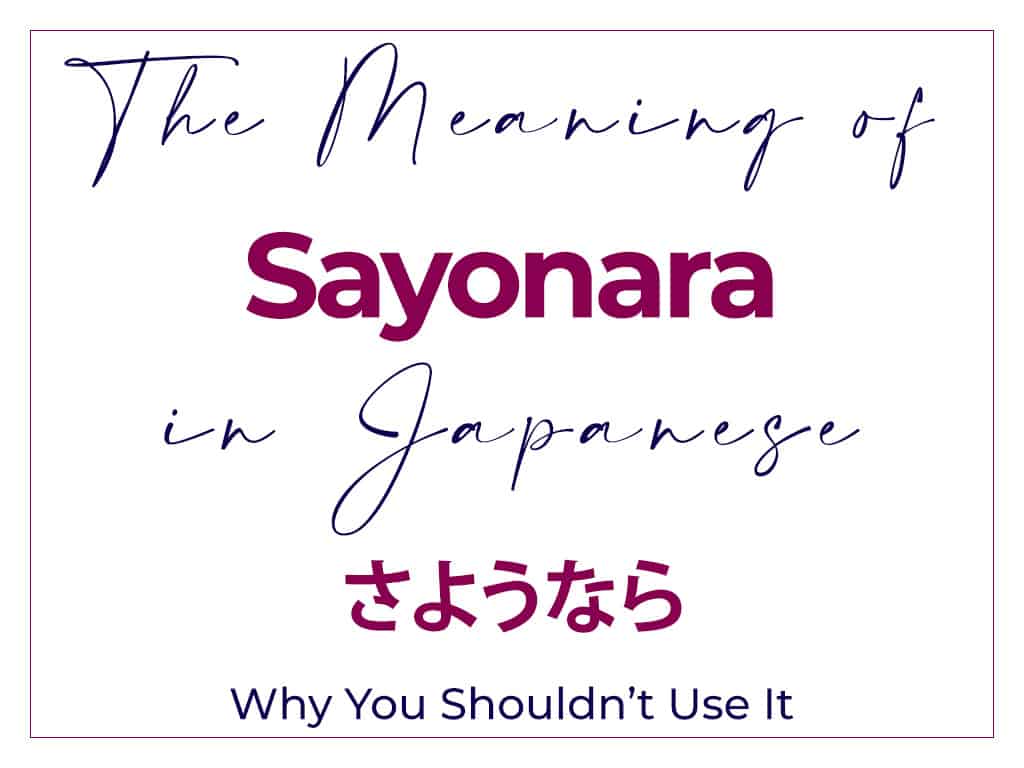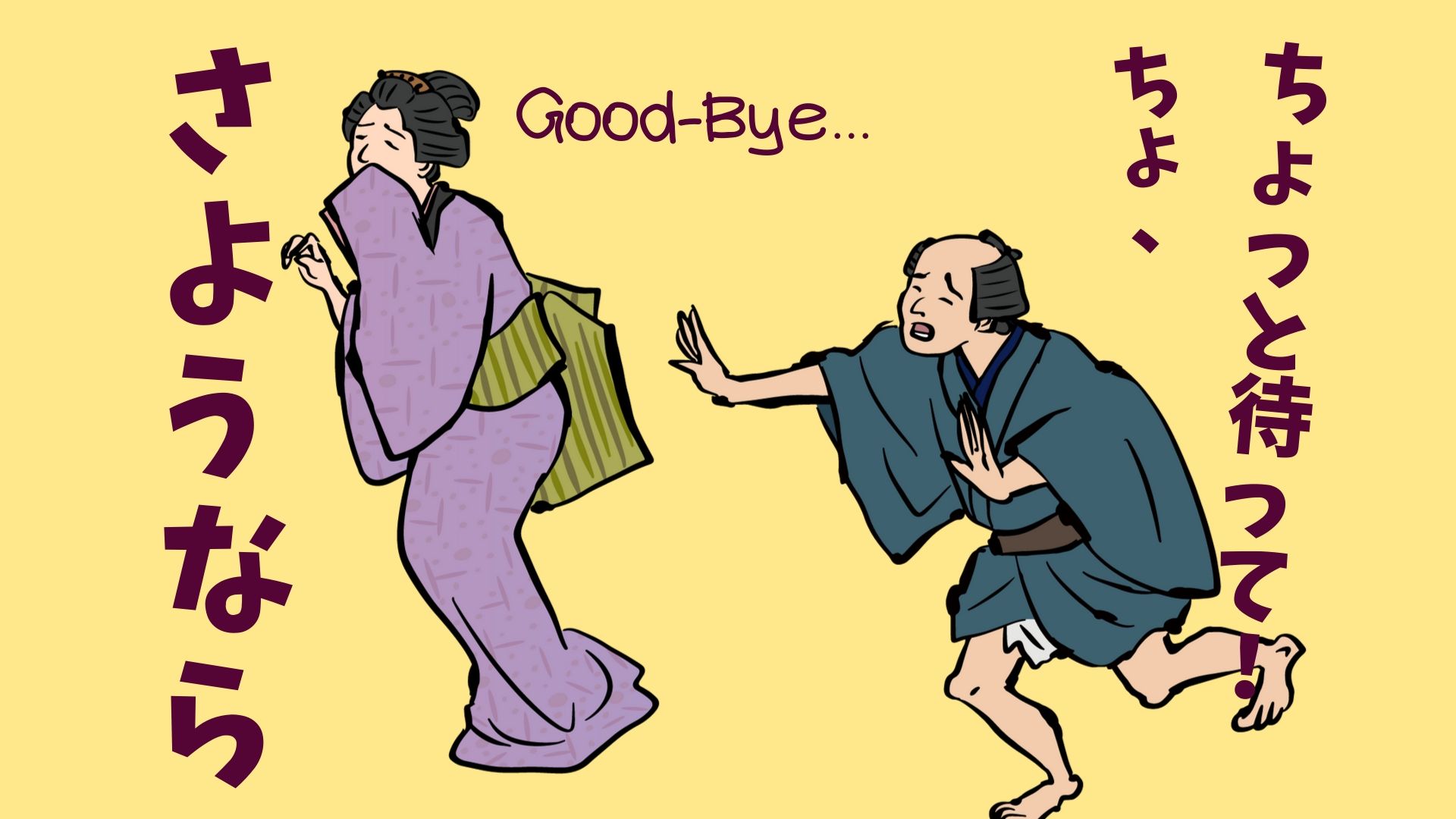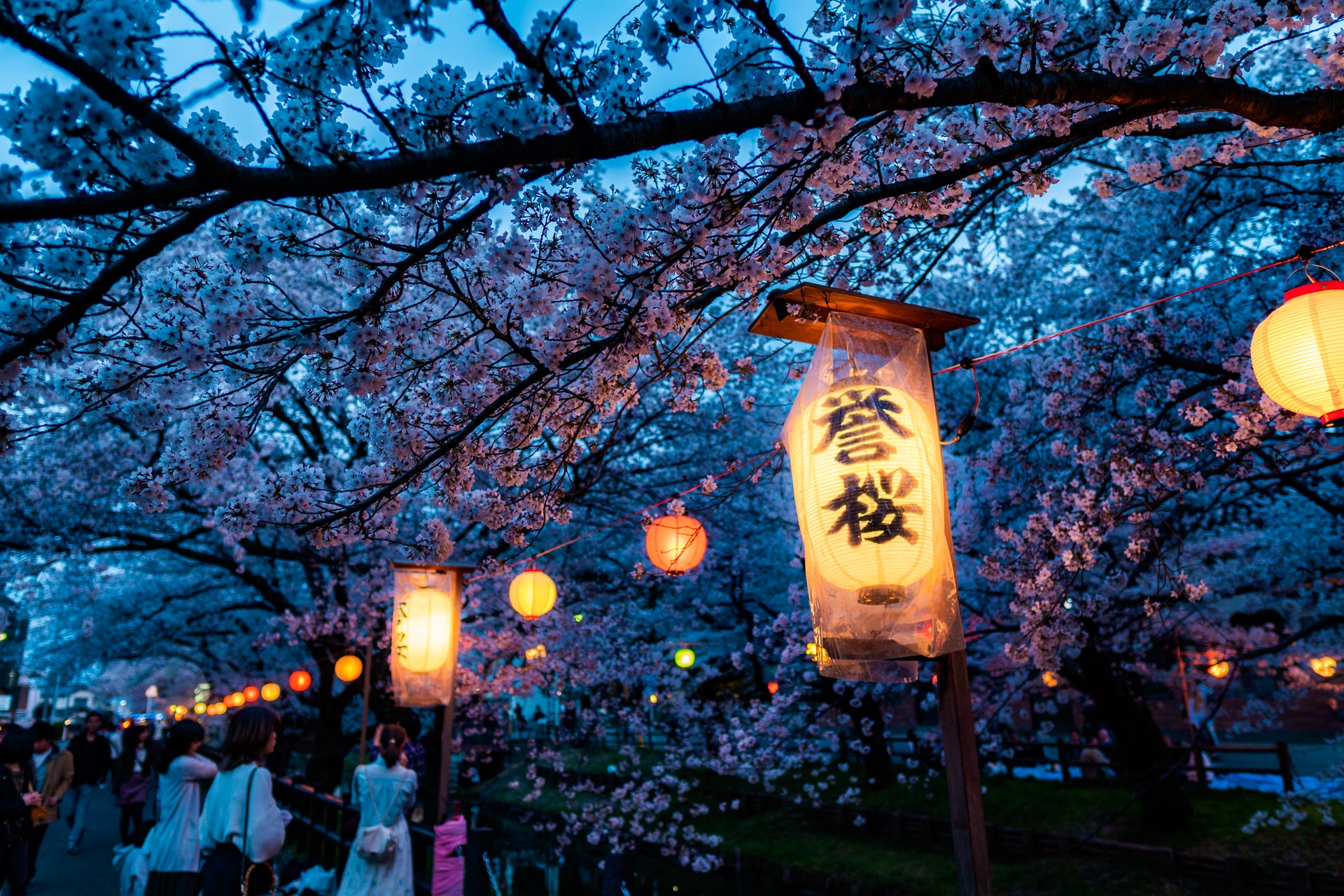Sayonara Meaning - More Than Just Goodbye
When you hear "sayonara," your mind might just jump to a simple "goodbye," like waving a quick farewell to someone. It's a word that has made its way into many places outside of Japan, so it's really common to think of it that way. But, you know, for those who speak Japanese, or anyone who has spent some time around the language, there's a lot more to it than just a casual parting word. It carries a certain kind of feeling, a weight, that a simple "see you later" just doesn't have.
Actually, that familiar sound, "sayonara," holds a deeper sort of message, a kind of lasting separation. It's not the kind of thing you'd typically toss out when you expect to run into someone again in a short while. In a way, it's almost like saying "farewell forever," or at least for a very, very long time. That makes it quite different from how many of us might use "goodbye" in our own daily chats, doesn't it? It’s a word with a bit more gravity.
This idea of a more permanent goodbye, this true sayonara meaning, can be quite surprising for many folks. It brings with it a sense of finality, a feeling that things are truly coming to an end. We're going to take a closer look at what this word really means, how it's used, and why it holds such a special place in the Japanese language, giving us a clearer picture of its actual use and its cultural feel.
Table of Contents
- What Does Sayonara Meaning Really Convey?
- When Do People Say Sayonara Meaning in Japan?
- How Does Sayonara Meaning Feel in Everyday Talk?
- Are There Other Ways to Express Sayonara Meaning?
- What's the Difference - Sayonara Meaning Versus Other Goodbyes?
- Wrapping Up the Sayonara Meaning
What Does Sayonara Meaning Really Convey?
Many of us pick up "sayonara" as one of the very first Japanese words we learn, and it's usually presented as the simple equivalent of "goodbye." That's a common starting point, and it's not entirely wrong, but it misses a whole lot of the actual picture. It's like seeing just the tip of a very large mountain, you know? The real depth of the word, its true sayonara meaning, goes quite a bit further than that quick translation. It often implies a parting that isn't just for a little while.
The idea behind "sayonara" often points to an indefinite separation, a moment when you are saying goodbye and don't quite expect to see that person again, or at least not for a very, very long stretch of time. So, it's not the kind of word you'd use with your coworker whom you'll see again tomorrow, or with your family members you'll be having dinner with later. It carries a sense of something more lasting, a feeling of things truly coming to a close for a while, or perhaps even for good. This makes its use rather specific.
Sometimes, people use "sayonara" almost like an exclamation, a sudden burst of feeling when something is truly over. It can be interjectional, a way to mark a decisive end to a situation or a relationship. Think of it as a way to express a firm "that's it," or "it's done." This kind of usage, in a way, really shows how much finality is built into the word itself. It’s not just a polite way to leave; it’s a declaration of a conclusion.
The True Weight of Sayonara Meaning
The phrase "farewell forever" comes closer to describing the core sayonara meaning in Japanese. It's a strong expression that native speakers typically reserve for moments when a separation is truly significant. You might say it when someone is moving far away and you don't anticipate your paths crossing again, or perhaps when you're leaving a situation that you won't be returning to, like a job you're truly done with. It's a word that marks a real turning point, a definitive end to a shared experience or connection.
Consider the emotional impact of saying "farewell forever" versus a simple "see you soon." The former carries a much heavier feeling, doesn't it? That's the sort of emotional baggage, in a good way, that "sayonara" often carries. It's a word that acknowledges the seriousness of a parting, recognizing that this might be the last time you share a moment with someone or something in that particular way. It's quite a powerful word, really, when you consider its full scope.
So, while it does translate as "goodbye," understanding the sayonara meaning really means grasping that deeper layer of indefinite separation. It's a word that isn't thrown around lightly in Japan, and its use often signifies a moment of true departure, a farewell that carries with it the possibility, or even the expectation, of not meeting again. This distinction is pretty important for anyone trying to get a better feel for the language and its cultural subtleties.
When Do People Say Sayonara Meaning in Japan?
Given the deep meaning of "sayonara," it's not a word you'll hear all the time in everyday Japanese conversations. People in Japan tend to use it quite sparingly, reserving it for specific situations where a longer-term separation is truly on the cards. It's not the go-to phrase for saying goodbye after a quick visit to the store or leaving work for the day. That would feel a bit strange, almost like saying a final goodbye when you expect to see someone the very next morning. So, it's really about the context.
You might use "sayonara" if you're leaving a place for good, like moving to a different country, or if you're ending a significant chapter in your life. It's a word that marks a real boundary, a point of no return for a particular interaction or relationship. It's a way of acknowledging that this parting is something more than just a temporary pause. This makes the sayonara meaning quite specific in its application, pointing to moments of true transition.
It's also interesting to note that because of its strong implication of finality, many Japanese people actually prefer to use other, softer ways to say goodbye in most daily situations. They might use phrases that imply "I'll be back," or "see you again," even if they don't have a firm plan to meet up. This preference for less definitive goodbyes further highlights how much weight "sayonara" truly carries. It's a word that's almost saved for those bigger moments.
Is Sayonara Meaning a Casual Farewell?
Despite how it's often introduced in language classes, "sayonara" is generally not a casual way to say goodbye in Japan. If you're looking for something similar to "so long" or "see ya," there are many other expressions that fit the bill much better. Those phrases are light and imply a quick return, which is pretty much the opposite of what "sayonara" usually means. So, it's not something you'd typically use for a quick parting with a friend you'll see later that week.
Consider the example of saying goodbye to a grandmother who is traveling. If she's just going on a trip and will be back, you wouldn't typically use "sayonara." You'd use something that implies a return. However, if she was moving permanently to another country and you knew you wouldn't see her again, then "sayonara" would be a fitting, albeit sad, expression. The context of the parting truly shapes the choice of words, and the sayonara meaning here dictates a more serious tone.
Similarly, when someone talks about saying "sayonara" to a terrible job at the end of a long period, that's a perfect example of its proper use. It's not just leaving for the day; it's leaving for good, with no intention of returning. It's a definitive break, a moment of finality. This kind of situation really captures the essence of what "sayonara" is meant to convey, making it clear that it's far from a lighthearted, casual farewell. It's a statement of closure, basically.
How Does Sayonara Meaning Feel in Everyday Talk?
When you hear "sayonara" used by a native speaker, there's often a certain atmosphere that comes with it. It's not usually accompanied by a cheerful wave or a quick nod. Instead, it might be spoken with a touch of seriousness, perhaps a little sadness, or even a sense of relief if it's about leaving a bad situation. The feeling it carries is one of conclusion, of a chapter closing, rather than just a pause in an ongoing story. It's a word that can really make you feel the weight of a moment.
The phrase itself, when you break it down, comes from "さようなら (sayounara)," which has roots in meaning something like "if it must be so." This origin really helps to explain why it carries such a strong sense of finality. It's like acknowledging that this parting is a necessary, perhaps unavoidable, outcome. This deeper sense is really what gives the sayonara meaning its distinct emotional resonance, making it more than just a simple translation.
Because of this, you won't hear "sayonara" tossed around as often as you might hear "bye" or "ciao" in other languages. It's a word that's reserved for those moments when a true parting is happening, a separation that feels significant. It’s almost like a respectful acknowledgment of the end of something. So, if you hear it, you can be pretty sure that the person saying it feels that the goodbye is a real one, not just a temporary pause.
The Root of Sayonara Meaning - A Deeper Look
The literal translation of "sayonara" as "if it must be so" or "until we meet again" truly highlights its underlying sentiment. This isn't a cheerful "see you soon" but rather an acceptance of a parting that might last indefinitely. It conveys a sense of resignation, a quiet acknowledgment that circumstances dictate a separation. This deep historical root gives the sayonara meaning a very particular flavor, one of acceptance in the face of distance.
Think about the implications of saying "if it must be so." It suggests that the parting isn't necessarily desired, but it's understood as something that has to happen. There's a quiet strength in that, a recognition of reality. This is why "sayonara" feels so much more profound than a simple "goodbye." It's not just a word; it's a small philosophy about the nature of goodbyes themselves. It’s a bit like saying, "this is how it is, then."
The phrase "until we meet again" also adds to this sense of potential finality. While it offers a glimmer of hope for a future reunion, it doesn't promise one. It simply acknowledges the possibility, while the immediate reality is one of parting. This subtle nuance is a big part of what makes the sayonara meaning so rich and, in some ways, so poignant. It really speaks to the human experience of parting ways, whether for a short time or a long one.
Are There Other Ways to Express Sayonara Meaning?
Yes, absolutely. While "sayonara" is the word many outside Japan know best for "goodbye," people who speak Japanese regularly use a whole host of other phrases depending on the situation, the level of politeness needed, and how likely they are to see the person again. There are many ways to say goodbye, and each one carries its own particular shade of meaning. This means that the sayonara meaning isn't the only way to express parting, it's just one of many.
For instance, if you're leaving work for the day, you might say "otsukaresama deshita," which acknowledges the hard work of others. If you're leaving a friend's house, you might say "ja ne" or "mata ne," both implying "see you later." These alternatives are far more common in daily interactions because they don't carry the heavy implication of indefinite separation that "sayonara" does. They keep things light and open for future encounters, which is usually the desired outcome, you know?
Learning about the original meaning of "sayonara" often leads people to discover these alternative ways to say goodbye. It's a good way to get a better feel for the language's social rules and how people communicate their intentions. Understanding that "sayonara" is often a word for truly significant partings helps you choose the right words for different situations, making your conversations feel more natural and respectful. It's pretty interesting, really, how much variety there is.
Sayonara Meaning - A Sense of Ending
The fact that "sayonara" often implies an indefinite separation means it's used when there's a clear sense of ending. It's not just a pause in communication; it's a cessation, a moment where a connection or a situation concludes. This can be seen in how it's used in popular culture too, often marking a dramatic or significant farewell. It's a word that truly signifies a point of closure, which is a big part of its sayonara meaning.
When you hear "sayonara," it's like the speaker is drawing a line in the sand, marking the end of something. This makes it a powerful word for expressing finality, whether it's the end of a relationship, the end of a long project, or the end of a period of time spent together. It's a word that doesn't leave much room for ambiguity about the nature of the parting, making it very clear that this is a goodbye that carries weight. It's almost like a punctuation mark.
So, while it's tempting to use "sayonara" as a catch-all for "goodbye," remembering its deeper implication of a lasting separation helps to use it appropriately. It's a word that respects the gravity of certain partings, and choosing to use it implies that you understand and acknowledge that gravity. This deeper understanding of the sayonara meaning truly enriches one's appreciation for the Japanese language and its subtle ways of expressing human connections.
What's the Difference - Sayonara Meaning Versus Other Goodbyes?
The core difference between "sayonara" and many other ways to say goodbye in Japanese lies in the expectation of reunion. Most common farewells, like "mata ne" (see you) or "itte kimasu" (I'm going and coming back), carry the implicit promise or expectation of meeting again soon. "Sayonara," however, often comes without that expectation. It's a goodbye that doesn't necessarily look forward to a quick return, which is a key part of its sayonara meaning.
This distinction is pretty important in Japanese social interactions. Choosing the right goodbye shows respect for the situation and the relationship. Using "sayonara" for a casual parting could feel a bit dramatic or even rude, as it might imply you don't expect to see the person again, even if you do. It's a bit like saying "farewell" in English when a simple "bye" would do; it just feels a little out of place, you know?
For example, if you're leaving a shop, you wouldn't say "sayonara." You'd likely hear "arigato gozaimasu" (thank you very much) or "mata kudasai" (please come again). These phrases are appropriate for a temporary interaction. The absence of "sayonara" in such common scenarios truly highlights its more serious, more definitive nature. It’s a word that’s reserved for bigger moments of parting.
Sayonara Meaning in Actual Use
When you see examples of "sayonara" used in a sentence, it often confirms this sense of finality. It's not typically found in phrases like "Sayonara, see you tomorrow!" but rather in contexts that suggest a more permanent separation. For instance, someone might say, "Kore de sayonara da," which could mean "This is goodbye for good." The context almost always points to a significant parting, not a fleeting one.
Even when "sayonara" is used in an informal or even humorous way, particularly when referring to Japan itself, it still carries that underlying sense of finality. It might be used playfully, but the core meaning of a definitive adieu is still there. It's like saying "adieu" in English; it sounds a bit old-fashioned and formal, but everyone still knows it means a lasting goodbye, not just a quick break. This is a bit like the sayonara meaning in casual contexts.
Both "sayonara" and "sayounara" are essentially the same word, just spelled a little differently in how they're written down. Native speakers use these two forms in pretty much the same way, carrying the same strong implication of a lasting farewell. So, whether you see it written one way or the other, the deep sayonara meaning remains consistent: a goodbye that means more than just a temporary parting.
Wrapping Up the Sayonara Meaning
So, we've taken a good look at "sayonara," a Japanese word that's often heard but perhaps not always fully understood. While it does translate to "goodbye," its true sayonara meaning goes much deeper, often implying a "farewell forever" or an indefinite separation. It's a word rooted in the idea of "if it must be so," carrying a sense of finality and serious parting.
We saw that it's not a casual farewell used for everyday goodbyes, but rather reserved for significant moments, like leaving a job for good or saying goodbye to someone moving far away. Its use is distinct from the many other, lighter ways to say goodbye in Japanese, which usually imply an expectation of seeing someone again soon. Understanding this distinction helps to appreciate the nuances of the Japanese language and its cultural expressions of parting.
Whether it's the literal translation, its use as an interjection, or the way it's used in real-life examples, the sayonara meaning consistently points to a goodbye that carries weight and a sense of closure. It’s a word that truly makes you feel the gravity of a moment of separation, marking a definitive end rather than just a temporary pause.


